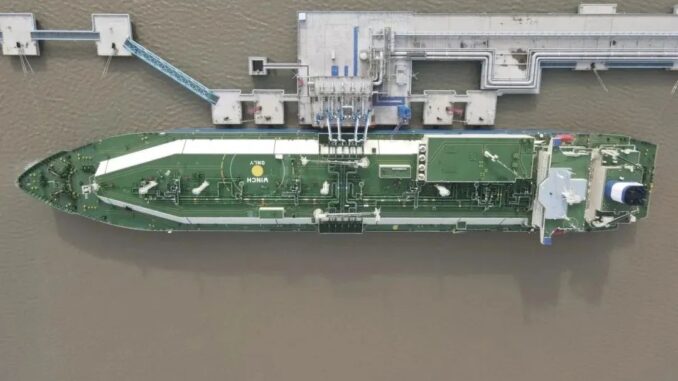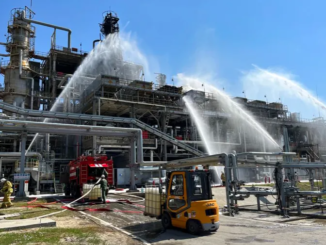
ENB Pub Note: This LinkedIn article from Fei Xu has some great information about the market re-balancing of China’s reselling of LNG shipments. What she fails to cover in this article is the second-order magnitude impact. This again allows another avenue for Russia, Iran, and others to bypass Western sanctions placed on their energy exports rendering sanctions useless, and giving China even more power.
Independent Commodity Intelligence Services (China)
We believe Chinese LNG re-export activity will continue to grow this winter, as global volatility and arbitrage opportunities persist. As Chinese players become increasingly adept at LNG trading, in the aftermath of last year’s astronomical geographical arbitrage, China has grown its LNG re-exports to 14 cargos in the first ten months of 2023, from eight in the same period of 2022, according to ICIS’s LNG Edge trade flows.
Apart from monetary gains, the need to comply with Take-or-Pay (ToP) liability under strict destination clauses also supports re-export growth amid slowing domestic demand. In the longer term, the recently approved bonded LNG tanks (tax-free storage) at Ningbo and Dalian LNG terminals, and PipeChina’s latest third-party-access (TPA) service will enable more Chinese traders to reload LNG to international markets.
China LNG re-exports will eventually increase terminal utilization and flexibility in balancing Chinese demand and the wider Asia region.
Analysis
Chinese re-exports surged when lucrative arbitrage opportunities emerged in 2022.
Re-export activities in China ramped up significantly in 2022. A re-export is when traders reload an already discharged LNG cargo back onto a vessel for export to other countries. Chinese traders were facing stagnated gas demand due to COVID and economic slowdown at the time. Meanwhile, Asian spot prices soared well above the domestic sales price. As a result, the excess of contractual LNG in China became cost-competitive resources to be sold into other markets.
Prior to May 23, when spot prices fell and arbitrage narrowed, Chinese traders managed to resell 15 cargos since 2022, an equivalent to 0.9 million tonnes to the international market at an average price of $33/MMbtu. The estimated average margin for re-exports in 2022 reached as much as $62 million per cargo.
China’s muted domestic demand made it stand out as an obvious choice for LNG re-export supplier in Asia. The main buyers of Chinese re-exports were South Korea and Japan, accounting for 67% of the volume so far, followed by Thailand, Kuwait and Bangladesh.

Chinese re-exports remain profitable this winter.
In the near term, ICIS EAX, the North Asia spot index is estimated to hover around $16/MMbtu, whereas the estimated average term LNG cost into China would be $10 to $12/MMbtu. ICIS arbitrage calculator suggests that re-selling an LTC cargo to the Asian markets remains profitable at the Yangpu terminal in China, with margins varying from $1.5/MMbtu to $4/MMbtu. Thailand presents ample potential for achieving the highest profit margin, closely trailed by Singapore and Taiwan.
Strict ToP obligations with destination clause has forced Chinese players to turn to re-exports.
PetroChina International (PCI) has been the dominant player in the re-export activities so far, followed by JOVO Group, according to market comments. Both possess contracted volumes that exceed domestic demand.
PetroChina almost doubled its LNG Long-term contracts (LTC) volumes in 2019 to ensure the nation’s gas supply security. However, with the ease of the coal-to-gas switch and a slowdown of LNG demand growth, PetroChina has only imported less than 80% of its contracted volume in the same period, according to ICIS LNG Edge’s vessel tracking database. In the year 2022, we estimate PetroChina re-exported 2% of its total contracted volume. Similarly, Jovo’s Dongguan LNG terminal import peaked in 2020 and has been severely underutilized since. Since 2022, JOVO Group has been actively expanding its LNG business beyond the Southern market where the Dongguan terminal is located, including the international market.
Re-exports emerge as the ideal gateway to avoid financial losses and offset market volatility, meanwhile still in compliance with the strict ToP obligations and destination clauses.

As tax-free bonded LNG tank capacity increases so will re-export trades.
The re-export activities rely on the availability of bonded tank infrastructures. Due to its tax-free status, such facilities help to reduce the overall cost of LNG re-export.
Having experienced the substantial profit gains of arbitrage trades in 2022, the Chinese government and state enterprises swiftly expanded the nation’s bonded tank capacity by over 66% the following year. In the past few months, China has further approved another 2 bonded LNG tanks with a total capacity of 320,000 cubic meters. This will enable a bigger portion of import volumes to participate in re-export trades.
CNOOC Zhejiang Ningbo LNG terminal had its first re-export activity in September 2023, 3 months after its second bonded tank was approved. The PipeChina Dalian LNG terminal re-exported its first cargo in November 2023, delivered to Thailand in late November 2023, according to ICIS LNG Edge vessel tracking.

More market players will have access to the re-export with PipeChina’s new bonded LNG re-loading service starting in April 2024.
Between November 2023 and January 2024, PipeChina will accept requests for medium to long-term terminal usage bookings from third parties. PipeChina has also announced that the three 160,000 cubic meters bonded LNG tanks in the Dalian and Hainan Yangpu LNG terminals can provide tax-free reloading services to the public. The minimum booking for the new reloading services is three years – to a maximum of 20 years, similar to the existing TPA service.
Conclusion
Re-exports will be a new leverage for Chinese traders to optimize terminal utilization and portfolio management. It will also benefit the Asian market, in the case of global supply disruptions and market balancing. Chinese re-exports are expected to significantly increase going forward if volatility and significant arbitrage opportunities persist. We also expect a greater number of Chinese market participants in international LNG trading through re-exports following PipeChina’s latest re-loading services at the Yangpu and Dalian LNG terminals.
Fei Xu, Senior Energy Market Analyst



